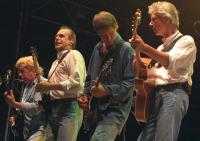The origins of this now legendary band lie in The Spectres, a London based beat group. Founder members Francis Rossi (guitar/vocals) and Alan Lancaster (bass) led the act from its inception in 1962 until 1967, by which time Roy Lynes (organ) and John Coughlan (drums) completed it's line up.
The Spectres three singles encompassed several styles of music, ranging from pop to brash R & B, when these proved commercialy unsuccessfull the band took on a new name, Traffic Jam.
After the arrival of Rick Parfitt in 1967 the group changed it's name again to STATUS QUO.(According to the Cambridge English Dictionary Status quo means the present situation.)
In the following year their debut single, "Pictures of Matchstick Men" reached number 7 in the charts. The follow up release to this was "Black Veils Of Melancholy". Another UK Top 10 hit was scored with "Ice in the Sun".
Subsequent recordings in a similar vein struggled to follow such success, and dispite reaching number 12 with " Down the Dustpipe" Status Quo was increasingly viewed as a novelty. The song itself however indicated the musical direction unveiled more fully on "Ma Kelly's Greasy Spoon". The album included Quo's version of Steamhammer's "Junior's wailing", which had inspired this conversion to a simpler, "boogie" style. Gone too were the satin shirts,frock coats and kipper ties, replaced by long hair, denim jeans and plimsolls.
Dilligent live appearances build up a grass root following and impresive slots at the Reading and Great Western Festivals (1972) which signalled a commercial turning point. Now signed with the renowed Vertigo Lablel, Status Quo scored a UK TOP 10 hit with "Paper Plane", but more importantly Quo reached Number 5 in the Album Charts with "Piledriver". A subsequent release, "Hello", entered at number 1, confirming the groups emergence as a major attraction.
Each of their 70s Albums reached the Top 5, while a concistent presence in the singles charts included such notable entries s "Caroline"(1973), "Down Down"(1974), "What ever you want"(1979) and "Lies/Don't drive my Car"(1980).
Quo also proved adept at adapting outside material as shown by their version of John Fogerty's "Rockin All Over The World"(1977) Quo undertook a lenghy break in 1980, but answered roumors of a permanet split with "Just Supposin".
John Coughlan left the group in 1981 in order to form his own act, Diesel. Peter Kircher took his place. Rifts within the band between Lancaster, Rossi and Parfitt started to appear and Alan moved to Australia in 1983, but he remained a member for the next 2 years. Lancasters final appearance with the group was at Live Aid in 1985.
After winning the injunction, Alan took out against Rossi/Parfitt to stop them performing without him under the name Status Quo, Rossi/Parfitt brought in John "Rhino" Edwards (bass), Jeff Rich(drums) and keyboard player Andy Bown.
The much loved Status Quo have carved a large niche for themselves in music history by producing uncomplicated, unpretentious and infectious rock music, their track record is incredible - just to mention two noteworthy ones,
Worldwide sales of over 100 million
